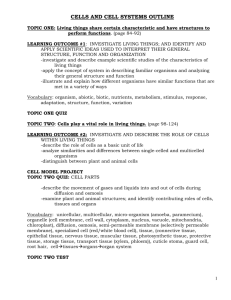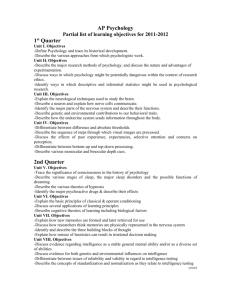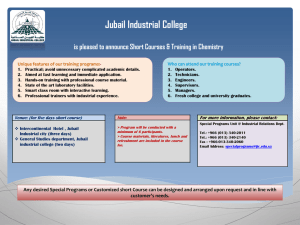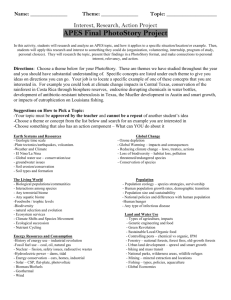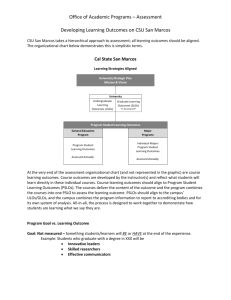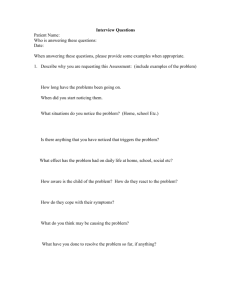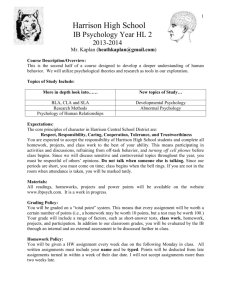Psychology - Mr. McCullough`s Page
advertisement
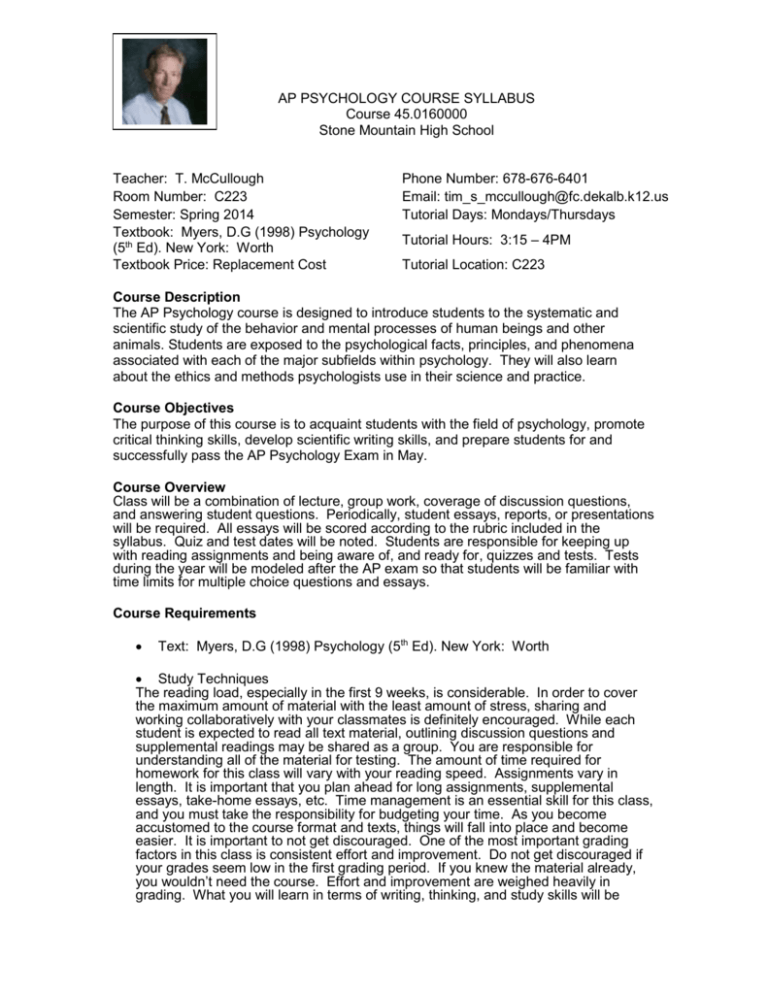
AP PSYCHOLOGY COURSE SYLLABUS Course 45.0160000 Stone Mountain High School Teacher: T. McCullough Room Number: C223 Semester: Spring 2014 Textbook: Myers, D.G (1998) Psychology (5th Ed). New York: Worth Textbook Price: Replacement Cost Phone Number: 678-676-6401 Email: tim_s_mccullough@fc.dekalb.k12.us Tutorial Days: Mondays/Thursdays Tutorial Hours: 3:15 – 4PM Tutorial Location: C223 Course Description The AP Psychology course is designed to introduce students to the systematic and scientific study of the behavior and mental processes of human beings and other animals. Students are exposed to the psychological facts, principles, and phenomena associated with each of the major subfields within psychology. They will also learn about the ethics and methods psychologists use in their science and practice. Course Objectives The purpose of this course is to acquaint students with the field of psychology, promote critical thinking skills, develop scientific writing skills, and prepare students for and successfully pass the AP Psychology Exam in May. Course Overview Class will be a combination of lecture, group work, coverage of discussion questions, and answering student questions. Periodically, student essays, reports, or presentations will be required. All essays will be scored according to the rubric included in the syllabus. Quiz and test dates will be noted. Students are responsible for keeping up with reading assignments and being aware of, and ready for, quizzes and tests. Tests during the year will be modeled after the AP exam so that students will be familiar with time limits for multiple choice questions and essays. Course Requirements Text: Myers, D.G (1998) Psychology (5th Ed). New York: Worth Study Techniques The reading load, especially in the first 9 weeks, is considerable. In order to cover the maximum amount of material with the least amount of stress, sharing and working collaboratively with your classmates is definitely encouraged. While each student is expected to read all text material, outlining discussion questions and supplemental readings may be shared as a group. You are responsible for understanding all of the material for testing. The amount of time required for homework for this class will vary with your reading speed. Assignments vary in length. It is important that you plan ahead for long assignments, supplemental essays, take-home essays, etc. Time management is an essential skill for this class, and you must take the responsibility for budgeting your time. As you become accustomed to the course format and texts, things will fall into place and become easier. It is important to not get discouraged. One of the most important grading factors in this class is consistent effort and improvement. Do not get discouraged if your grades seem low in the first grading period. If you knew the material already, you wouldn’t need the course. Effort and improvement are weighed heavily in grading. What you will learn in terms of writing, thinking, and study skills will be worth the effort! Attendance in this class is essential. Much of the material for success is provided through lecture/discussion. Missing class can create problems. AP Exam The AP Exam will be administered on Tuesday, May 7 at 12 PM. A complete description of the AP exam is on the AP Central web site: http://apcentral.collegeboard.com Grading Tests There are a total of six tests for the semester. Each test is modeled after the AP Exam and will account for 50% of the total grade for the class. All tests are timed and are composed of multiple-choice questions (70%) and two essays (30%). Quizzes Quizzes will be given weekly over vocabulary terms and will account for 20% of the total grade. Homework/Daily Assignments will be given periodically throughout the semester and are designed to enrich each lesson. They consist of answering questions about chapters, reviews, and general homework checks. Homework/daily work accounts for 5% of total grade. Journal/Psych Lab-Field Experiments It will be necessary to maintain a journal of writing assignments and research date from experiments conducted in class and in the lab throughout the semester. All grades from the journal will be worth 10% of the total grade. Participation & Class Presentations Discussion and participation in experiments are essential to this course and it is necessary for students to be actively engaged. Participation is worth 15% of grade. Presentations are based on individual reading and research. Grading Scale: A = 90 – 100 C = 71 – 79 F = below 70 B = 80 – 89 D = 70 Unit Information Unit I: History, Approaches and Research Methods Content and/or Skills Taught: -Define psychology and trace its historical development -Describe how the different perspectives explore and explain human behavior -Identify basic and applied research subfields of psychology -Identify basic elements of an experiment (variables, groups, sampling, population, etc.) -Compare and contrast research methods (case study, survey, naturalistic observation) -Understand the importance of descriptive and inferential statistics in psychological research -Discuss the ethics of human and animal research Major Assignments and/or Assessments: Introduction and Chapter 1 Test Demonstration on phrenology Simulation of Pepsi Challenge Provide examples of research methods Students will replicate a psychological experiment and write up results Unit II: The Biological Bases of Behavior Content and/or Skills Taught: -Describe the structure of a neuron and explain neural impulses -Describe neuron communication and discuss the impact of neurotransmitters -Classify and explain major divisions of the nervous system -Describe functions of the brain structures -Identify four lobes of the cerebral cortex and their functions -Explain split-brain studies -Discuss the issue of Nature v. Nurture -Describe the nature of the endocrine system Major Assignments and/or Assessments: Chapter 2 Test Brainmercials assignment Brain Coloring book Students will write abstracts of empirical studies in the biological perspective. Unit III: Developmental Psychology Content and/or Skills Taught: -Discuss prenatal development -Illustrate development changes in physical, social and cognitive areas -Discuss attachment theories -Describe developmental theories of Piaget, Erickson, and Kohlberg -Distinguish between longitudinal and cross-sectional studies -Describe the early development of self-concept Major Assignments and/or Assessments: Chapter Test Student presentations on developmental theories Students will write abstracts of studies in developmental psychology Unit IV: States of Consciousness Content and/or Skills Taught: -Define consciousness -Describe the different stages of sleep -Analyze the different theories of dreaming -Determine common sleep disorders and their consequences -Discuss hypnosis and theories of hypnosis -Describe and differentiate psychoactive drugs and their effects -Discuss the nature of drug dependence Major Assignments and/or Assessments: Chapter test Sleep journals Students will write abstracts of empirical studies in this area Unit V: Sensation and Perception Content and/or Skills Taught: -Contrast the processes of sensation and perception -Identify the major components of the visual system and the function of each -Identify the major components of the auditory system and the function of each -Identify sensory thresholds -Discuss Gestalt psychology’s contribution to our understanding of perception -Describe the operation of sensory systems (five senses) -Discuss research of depth perception -Analyze the effect of perceptual set on sensory experience Major Assignments and/or Assessments: Individual papers/presentations on topics in sensation and perception Chapter test Unit VI: Learning Content and/or Skills Taught: -Describe elements of classical conditioning -Apply classical conditioning to different situations -Describe elements of operant conditioning -Apply elements of operant conditioning to different situations -Differentiate between various forms of reinforcement and punishment -Describe observational learning -Discuss the importance of cognitive processes and biological predispositions in conditioning Major Assignments and/or Assessments: Class demonstrations of classical and operant conditioning Chapter test Students will write abstracts of empirical studies on the application of classical and operant conditioning Unit VII: Memory Content and/or Skills Taught: -Analyze how humans encode, store and retrieve information in memory -Distinguish between automatic and effortful processing -Distinguish between implicit and explicit memory -Distinguish between sensory memory, short term memory and long term memory -Describe the importance of retrieval cues -Discuss the effects of interference and motivated forgetting on memory Major Assignments and/or Assessments: Chapter test replicate memory study and write up results Students will write abstracts of important empirical studies in memory Unit VIII: Thinking and Language Content and/or Skills Taught: -Describe the characteristics of language and evaluate the importance of language -Define a concept and explain why it is useful to problem solving -Differentiate between algorithms and heuristics -Analyze how fixation, confirmation bias, heuristics, overconfidence, framing and belief perseverance influence the ability to solve problems Major Assignments and/or Assessments: Chapter test Students will write abstracts of empirical studies in Thinking and Language Unit IX: Motivation and Emotion Content and/or Skills Taught: -Define motivation and identify motivational theories -Describe the physiological determinants of hunger -Discuss psychological and cultural influences on hunger -Define achievement motivation including intrinsic and extrinsic motivation -Describe the physiological changes that occur during emotional arousal -Discuss catharsis hypothesis -Describe biological response to stress Major Assignments and/or Assessments: Chapter test Unit X: Testing and Individual Differences Content and/or Skills Taught: -Trace the origins of intelligence testing -Describe the nature of intelligence -Identify the factors associated with creativity -Distinguish between aptitude and achievement tests. -Describe test standardization -Distinguish between the reliability and validity of intelligence tests -Analyze differences in test scores among people of different genders, races and ethnic groups Major Assignments and/or Assessments: Students create their own intelligence test Chapter test Students will write abstracts of empirical studies in intelligence Unit XI: Personality Content and/or Skills Taught: -Explain how the different perspectives - psychodynamic, humanistic, trait, and socialcultural approach the study of personality -Evaluate the advantages and drawbacks of each theory of personality -Determine how psychologists assess personality according to the various perspectives Major Assignments and/or Assessments: Chapter test Write abstracts of important empirical studies in this topic Unit XII: Abnormal Psychology Content and/or Skills Taught: -Identify the criteria used by psychologists to diagnose and understand psychological disorders -Describe characteristics of mood disorders -Describe characteristics of anxiety disorders -Describe characteristics of somatoform disorders -Describe characteristics of dissociative disorders -Describe the characteristics of schizophrenia -Describe the characteristics of personality disorders -Describe the characteristics of brain-based disorders Major Assignments and/or Assessments: Chapter test Individual presentations on psychological disorders Unit XIII: Treatment of Psychological Disorders Content and/or Skills Taught: -Identify the criteria psychologists use to diagnose psychological disorders -Describe the different treatment options for the various types of psychological disorders including psychoanalysis, humanistic therapies, behavior therapy, cognitive therapies, group therapy, family therapy, drug therapy Major Assignments and/or Assessments: Chapter test role play activity demonstrating knowledge of therapies Unit XIV: Social Psychology Content and/or Skills Taught: -Describe importance of attribution in social behavior -Explain the effect of role playing on attitudes in terms of cognitive dissonance theory -Discuss Asch’s experiment on conformity -Discuss Milgram’s experiment on obedience -Determine how the presence of others influences actions -Evaluate why people are attracted to each other -Describe conditions under which people are more likely to help each other -Define the terms stereotype, prejudice, discrimination -Determine biological and social contributors to aggression -Define culture and how it develops Major Assignments and/or Assessments: Chapter test Write abstracts for empirical studies in social psychology Other Course Materials Audiovisual Materials PBS series "Discovering Psychology" PBS series "The Mind" PBS series "The Secret Life of the Brain" PBS series "The Brain" PBS series "Abnormal Psychology"
